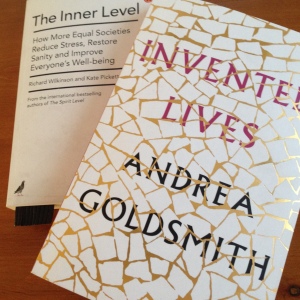Reinventing our lives: surviving with the help of literature
December 28, 2019 at 6:11 am | Posted in Andrea Goldsmith, Australia behind, Bookshops, capitalism, Charlotte Wood, creativity, depression, Inequality - Australia, mental illness, optimism, value of the arts, writers' health | Leave a commentTags: David Wallace-Wells, Hidden City: Adventures and explorations in Dublin by Karl Whitney, How to Be Right (in a world gone wrong) by James O’Brien, Invented Lives, Michael Gustafson and Oliver Uberti, Michael Winterbottom, Notes from a Public Typewriter, restore sanity and improve everyone’s well-being by Richard Wilkinson and Kate Pickett, The Inner Level: How more equal societies reduce stress, The Uninhabitable Earth: A story of the future
 When I was in Dublin in September I bought some wonderful books. A favourite is the intriguing, personal and beautifully written Hidden City: Adventures and explorations in Dublin by Karl Whitney (Penguin, 2014). (I’ve lent it and others to friends and can’t take a photo of its cover or some other favourites at the moment!)
When I was in Dublin in September I bought some wonderful books. A favourite is the intriguing, personal and beautifully written Hidden City: Adventures and explorations in Dublin by Karl Whitney (Penguin, 2014). (I’ve lent it and others to friends and can’t take a photo of its cover or some other favourites at the moment!)
Stitched Up: The anti-capitalist book of fashion (Pluto Press, London, 2014) is a compelling account of how the fashion industry exploits and damages both the environment and individuals. Tansy E. Hoskins’ exposé was an eye-watering shock to me on both counts.
I had no idea about the toxic chemicals involved in high-fashion clothes production, or how, for instance, models are sometimes treated as they are in the pornography industry – dispensable and beneath contempt.
Continue Reading Reinventing our lives: surviving with the help of literature…
Thinking women, hope and regeneration
June 12, 2019 at 6:56 am | Posted in Andrea Goldsmith, Australia behind, Australian novels, Democracy, Living creatively, Movies, optimism, Toni Jordan | 2 CommentsTags: 2040: Regeneration, Damon Gameau, Invented Lives, Julienne van Loos, Kafka, optimism in depressing times, Rebecca Huntley, Sarah Macdonald al, The Fragments, The Full Catastrophe, the importance of play, The Thinking Woman, Toni Jordan
It’s been hard to find anything uplifting to say in the last few weeks. The last time I read John Milton (1608-1674) was in English (Hons) many years ago. But I just came across a quotation from Paradise Lost that seems like a sanity-saver in the world we’re enduring now.
‘The mind is its own place, and in itself
Can make a Heaven of Hell, a Hell of Heaven.’
I can imagine a certain homeless lad I see often, camping endlessly outside Dickson Woolworths, waiting for a Government flat to come up – or any of those poor, skinny, desperate blokes on Manus Island or Nauru who find themselves simultaneously in Hell and in Limbo – saying, ‘Yeah, that’s easy for him to say!’
And yes, Milton had his books and his house, music and writing, and his wife (a succession of three) and children.
But everyone has his own trials and Milton was blind when he wrote Paradise Lost, and of course when writing poignant poems like ‘When I consider how my light is spent’. His first two wives died, he also lost a son and a daughter, and he had a strained relationship with his remaining daughters.
Blog at WordPress.com.
Entries and comments feeds.
